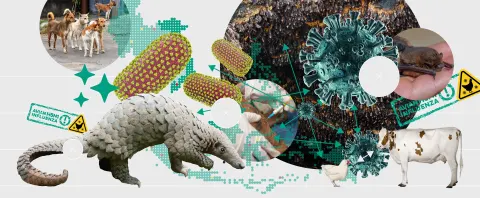Associated Sub-Fields:





Current research in pathogen biology is already creating pathways towards important healthcare improvements and the means to contain future outbreaks and limit their impact. It also offers profound discoveries: pathogen biology informs all biology, because pathogens are excellent model organisms.
Tools like rapid genome sequencing, immunological profiling and AI will enable the speedy development of new treatments that are tailored to emerging diseases. Furthermore, improved surveillance tools have the potential to swiftly monitor and contain outbreaks, and potentially even prevent them. Achieving these goals requires interdisciplinary research and depends on publicly available systematic datasets.
Despite the progress, much of the potential of this research is not being fully harnessed. Low- and middle-income countries often have limited capacity to detect, monitor and contain outbreaks.1 This is partly the result of a lack of capacity in scientific fields like genomics and structural biology2 — and means many countries are effectively flying blind when it comes to pandemic preparedness. In other countries, governments are reducing their support for pathogen biology and related fields.3 Researchers are anxious for policy-makers to see the value of continued research and development, which will be crucial in averting the worst impacts of the next pandemic.4
KEY TAKEAWAYS
Pathogens — organisms that infect us and cause disease — remain a grave threat to health and well-being. One level of research into this threat aims to unpick the mechanisms by which pathogens enter our cells, effectively Decoding infectivity. Improved understanding of these mechanisms will enable novel treatments and preventative strategies. A related effort focuses on Zoonotics and evolution across species: how pathogens that infect animals make the leap to infecting humans, and how we might prevent this. Similar research enables improved Epidemiology and prediction: outbreaks can now be tracked using multiple data sources. Finally, many teams are focused on Emerging opportunities for intervention, which step beyond existing tools like antibiotics to explore phage therapies, mRNA vaccines and more.
Anticipatory Impact:
Three fundamental questions guide GESDA’s mission and drive its work: Who are we, as humans? How can we all live together? How can we ensure the well-being of humankind and the sustainable future of our planet? We asked researchers from the field to anticipate what impact future breakthroughs could have on each of these dimensions. This wheel summarises their opinions when considering each of these questions, with a higher score indicating high anticipated impact, and vice versa.
- Anticipated impact on who we are as humans
- Anticipated impact on how we will all live together
- Anticipated impact on the well-being of humankind and sustainable future of our planet








